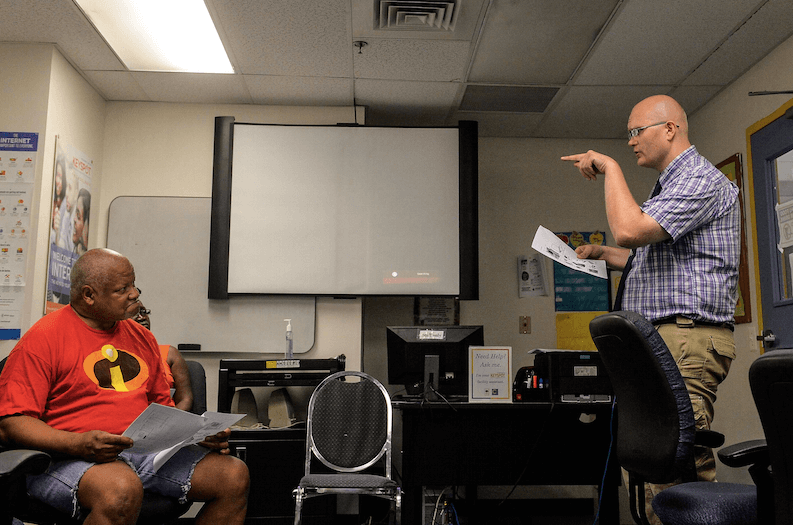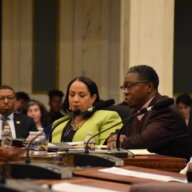When Karl Hanson applied for a job making picture frames in 2001, he filled out a paper application and waited to get called.
He’s 66, and he said he has long resisted learning new things. So when that job ended and it was time to find another, he was surprised to learn just how central using a computer would be in the hunt for a job he needs to bridge the gap between his pension and his living expenses. “I worked there for 14 years,” Hanson said. “I didn’t need a computer.”
Hanson discovered that he didn’t even know how to use a computer for a job hunt, nor how to use one to find a new apartment.
“I just felt lost,” Hanson said.
Decades after computers have become a near-ubiquitous feature of American life at home and at the office, a surprisingly large subset of the population lack the basic skills required to operate them. Related: For local board game designers, more than a roll of the dice It’s a fact of life that puts them on the other side of what experts call the ‘digital divide.’
On Thursday, Hanson attended a class on basic computer skills held at the People’s Emergency Center in West Philadelphia.
The instructor, Nathan Kuruna paced the lab, uttering bits of wisdom that might surprise anyone under 30.
“Having very exacting mouse skills is something we have to develop over time,” Karuna told the half-dozen students. During another portion of the lesson: “The box with the red X closes the window entirely.” Related:Second, even taller Comcast tower to break ground Two in ten people in Philadelphia did not have access to the internet at home, according to a survey by the Pew Research Center — but that data is fairly tricky to parse. It could include people who have smartphones with internet access but do not, for example, have a computer at home. Other data from the U.S. Census Bureau says that while 90 percent of households in the entire region — which includes the suburbs — have a computer, but 82 percent had high speed internet access. Both surveys show that people without internet access in Philadelphia tend to be elderly, or low income. “Sometimes it’s mind-blowing to people when I say there are people with no skills,” Kuruna said. “I teach a lot of underserved populations.”
Hanson, for example, was given a computer years ago, but never figured out how to do anything besides play Solitaire. He bought another earlier this year, and figured out how to get an email address, but hasn’t made the leap using it to find a job. Tan Vu, who runs the PEC’s Digital Inclusion Project, said that experience is fairly typical. There are people who come into the classes having never turned on a computer. But then there are people who have e-readers or smart phones, but haven’t made the conceptual leaps necessary to work off of a desktop or laptop. “We get people who say, ‘I just want to use Facebook’” Vu said.
But instructors see a huge benefit in learning even basic skills. The trick is getting them in the door.
Since 2011, about 3,600 people in the Philadelphia-area — and 3.2 million nationally — have taken similar classes funded by Comcast as part of its Internet Essentials program, which also offers low cost internet and access to inexpensive computers to help bridge the digital divide. Bob Smith, a regional vice president for Community Affairs at Comcast said one of the toughest parts of getting people to figure out how the internet would be relevant to them. Sure, some want to learn how to look for a job, but others want to be able to make flyers for their church, or use email to share photos of grandchildren. “It’s not just about doing homework and finding a job,” said Bob Smith, a regional vice-president for community investment at Comcast. “Online banking, online shopping. Why shouldn’t these people have access to that?” To find computer classes:
People’s Emergency Center (3939 Warren St.):
Tuesdays and Thursdays, 10 a.m. to 11:30 a.m., Sept. 1 to Oct. 1
Call 267-777-5860 or e-mail di_pec-cares.org to register
Philadelphia OIC (1231 N. Broad St.):
Mondays, Wednesdays and Fridays, noon to 1:30 p.m., Sept. 2 to Oct. 7
Call 215-236-7700 x350 to register
Career Wardrobe (21 S. 12th St.):
Sept. 9, 9 a.m. to noon
Sept. 18, 9 a.m. to noon
Oct. 14, 9 a.m. to noon
Call 215-568-6693 to register
There are computers everywhere, but some still don’t know how to use them

Charles Mostoller





























